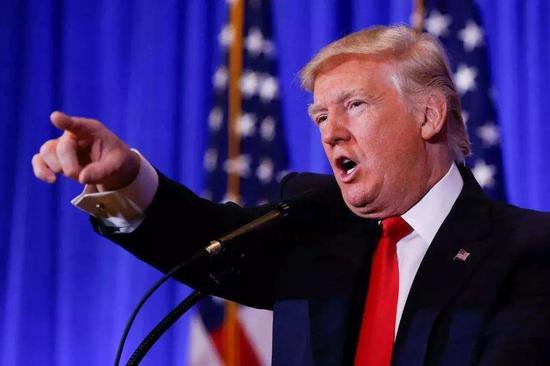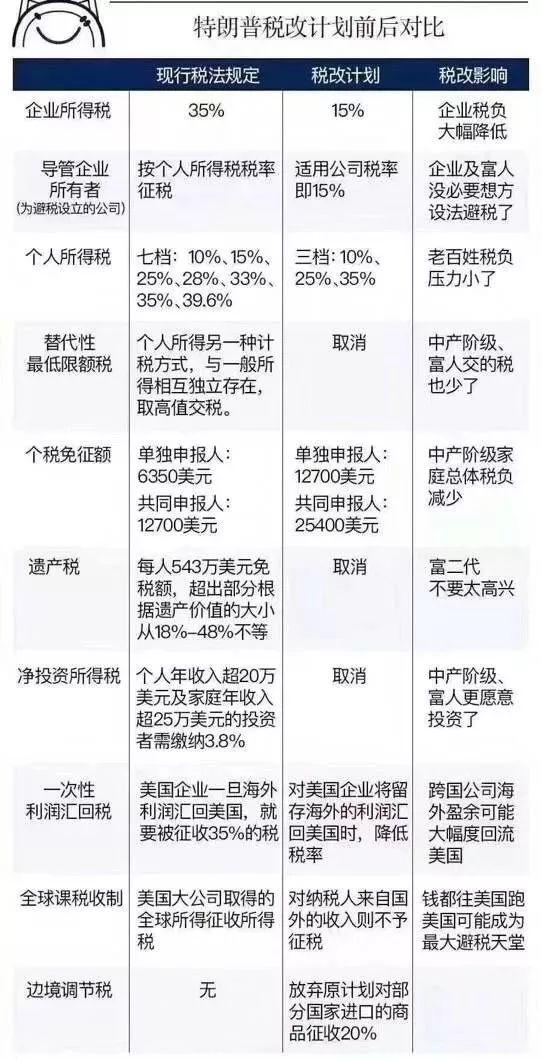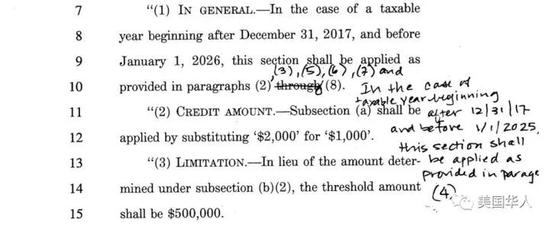
In any other year, Trump finally made a beautiful turnaround.
In the early morning of December 3, local time, in the enduring game between the parties, the Senate passed the Republican Party’s more than 500-page tax reform plan with 51 votes in favor and 49 votes against.
In the opinion of the US public opinion, this not only means a major victory for Trump and the Republican Party, but also the biggest adjustment to US tax law for more than 30 years. According to the newly passed tax reform bill, the corporate tax rate in the United States will be reduced from 35% to 20%, and personal income tax will be lowered in different grades.
The United States, the world's largest economy, the core hinterland of the global capital market, and its substantial fiscal and tax reforms will undoubtedly have a huge spillover impact on the world economy.
policy
The most direct influence of the US tax reform is, of course, the US economy.
As we all know, at this stage, there are two main means for the state to carry out macroeconomic regulation and control: First, fiscal policy, to increase the amount of cash in the market by increasing/decreasing taxes, thereby curbing overheating or stimulating economic development; second, monetary policy. Mainly, the central banks of various countries adjust their economic activities by raising/lowering the exchange rate of their own currencies and affecting the production costs of enterprises.
In the case of long-term monetary policy of zero interest rate or even negative interest rate in Japan, Europe and other countries, it is still difficult to stimulate economic development. The US fiscal and tax reform is expected to be high.
The most direct understanding is that the reduction of tax burden means the decline of disposable income and the cost of production and operation of enterprises. This will undoubtedly stimulate residents' consumption, increase corporate profits, promote reinvestment and enhance economic vitality.
The US tax fund estimates that the plan will increase real GDP in the United States by more than 9%, real wages by 8%, and create at least 2 million new permanent full-time jobs. Trump is even more eloquent: "This is a Christmas gift for all Americans this year! To save an average of $1,182 per year for every American family!"
Of course, the tax reform is very complicated, and it can be said clearly in a few words. In general, the United States has such a big change in this tax reform:

First of all, the "personal system" has been changed to a "local system", which means that as long as the tax has been paid overseas, the US company will not have to pay back if it is transferred back to the country. The move is widely believed to stimulate the return of profits from US companies.
In addition, tax rate levels have been greatly simplified, and multiple taxes have been eliminated, including estate taxes, alternative minimum tax ATMs, and so on. It can also encourage more economic activity.
At the same time, some voices, including some members of the United States, also believe that tax cuts will bring huge fiscal deficits to the US government. Earlier, according to estimates by the Independent Tax Policy Center, the House version of the tax reform bill will increase the US$1.3 trillion deficit for the United States in the next decade. There is still a lot of uncertainty as to whether the US government can withstand this.
However, these are only the judgments of some people. There are also many controversies surrounding these judgments. In fact, the current version is not the final version. There is still a difference between the bill passed by the Senate and the bill passed by the House of Representatives last month. What changes will be made in the future, and when it will be implemented, it still needs to wait.

influences
It is very important that as the globalization of the world economy continues to accelerate, no country can be independent of the economic activities of other countries. A country's fiscal and monetary policies will also have a profound impact on other countries' economies. For a country like the United States, which has a highly open financial market and a strong currency, its impact is even greater.
As the world's second largest economy, with a foreign exchange reserve of up to 3 trillion US dollars, and a country with a high degree of dependence on economy and trade, China is undoubtedly one of the most concerned countries in the scope of this tax reform spillover.
Mei Xinyu, a well-known economist and researcher at the Institute of International Trade and Economic Cooperation of the Ministry of Commerce, believes that theoretically, the impact of the US tax reform policy on China is mainly two-fold: first, the impact of capital flows, and second, the introduction of monetary policy. Follow-up impact.
First, according to its latest tax reform plan, the US corporate income tax will be reduced from 35% to 20%, which means that the company's operating pressure will drop sharply, which will largely drive the US's overseas retention. The large-scale return of profits back to China has stimulated the withdrawal of US companies from the Chinese market. China's balance of payments, foreign exchange reserves, and the RMB exchange rate will have a greater potential impact.
Secondly, it must be pointed out that the US tax reduction policy is based on the US fiscal policy of “increasing interest rates and shrinking the tableâ€. This combination of punches will undoubtedly affect the base money of other countries. How to understand? The so-called rate hike is to increase the exchange rate of the US dollar and the appreciation of the US dollar. Then the renminbi will depreciate in disguise. The principle of contraction is similar, that is, the Fed has to recover too much US dollars in the market. In short, the dollar, which was originally very strong, has become stronger, and objectively it has also caused depreciation pressure on the renminbi.
Generally speaking, the "double kill" of this monetary policy and fiscal policy will have a certain "tightening" effect on other countries. This double tightening not only causes great downward pressure on the market of primary products (unprocessed original products), but also further brings capital flight pressure, which has a great impact on the balance of payments and foreign exchange reserves. Shock.
We have to be vigilant about this wave of shocks.

Lenovo
Having said that, everyone must have a Lenovo in mind: in the mid-to-late 1980s, the US-led "Plaza Accord", a horrific conspiracy that many people think has led to the Japanese economy's sluggish decades.
What agreement can be as powerful as the legend?
This has to be said back to the United States in the 1980s, when the United States faced a crisis of excessive dollar exchanges, foreign trade deficits and government fiscal deficits. The trade deficit once accounted for 3.6% of GDP, and the economy was extremely unhealthy. What about Japan at that time? In 1985, the United States became the world's largest creditor country, and its products were filled with global capital and capital expanded wildly.
Therefore, in order to boost exports, there has been a voice in the United States that uses administrative means to lower the exchange rate of the US dollar and save US exports. Things progressed beyond imagination. In 1985, the finance ministers of the United States, Japan, the former Federal Republic of Germany, France, and the United Kingdom gathered at the New York Plaza Hotel, achieving a "substantial appreciation of the yen and the mark to restore the overvalued dollar price." Agreement.
Since then, it has been a well-known history. The yen has appreciated sharply. From the first quarter of 1985 to the first quarter of 1988, it rose by 54%. Then the huge economic bubble was punctured and the Japanese economy fell into stagnation for decades. It is the famous "lost decades" in economics textbooks.
So, is there a comparison between Japan’s case and today’s China? This time, when the news of the US tax reform came out, many people began to mourn that "the winter is coming, the capital is coming, and the good days are over." Is this really the case?
To a certain extent, as the world's second largest economy, the world's most important exporter of products, China's foreign exchange reserves have leapt to the top in the world, and the renminbi is facing great pressure to appreciate. This situation is very similar to Japan in the mid-1980s.
But the question is, is this logic reasonable?
Not to mention that in today's increasingly free market economy, it is completely unrealistic to be able to inflict heavy losses on other countries' economies with a single administrative force. Even in the case of the “Plaza Agreementâ€, the biggest impact of exchange rate changes is not the output and input of products, but the flow of capital and the corresponding wealth effect.
Therefore, it is far-fetched for many economists to attribute Japan’s “lost decades†to the “square agreementâ€. It is also wrong to regard the fiscal and taxation policy of the United States as simply a flood of beasts.
Thinking
Of course we can't underestimate the US tax reform policy, but the situation is far from that bad.
Imagine if the United States drastically cut taxes and further widened the tax burden gap with developing countries. Is it possible for other countries to be forced to make other tax and tax adjustments such as tax cuts under a series of pressures such as capital flight? In fact, the UK, France and other major developed countries have promoted tax cuts. And if this idea is really realized, this round of global tax cuts will undoubtedly reduce the policy effect of the US tax cuts to a certain extent.
In addition, it is very important that the analysis we have done before is based on the judgment of general economics, and the economic activities in reality are far more complicated and difficult to master than theories.
From the perspective of the United States, will the US tax cuts really push 100% of multinational companies back? Not really. The tax rate is only one of the factors affecting corporate investment. Other factors, including macroeconomic policies, business environment, and talent conditions, will have a great impact.
In Mei Xinyu's view, a single fiscal and taxation policy is also difficult to boost the US economy. It also needs to be combined with a series of social reforms such as the next welfare to play its best role. This is naturally also the need for transnational capital to be carefully considered.
Mei Xinyu pointed out that it is very important that "from Trump's visit to China, China's polity is suitable for the Chinese people. In the recent series of actions, he prefers to reduce intervention in the outside world and focus on domestic economic reform. Inspiring production labor... This concept is not a good thing for China and the outside world. China and the United States are not enemies. The United States is focusing on domestic economic development and boosting its economy. It is not a bad thing for China.
In Mei Xinyu's view, the most important thing China should do now is to focus on its own series of reforms and not to be chaotic by outside actions. The US tax reform may have certain impact pressure on China, but it can also be turned into an opportunity for reform.
There are still some latent problems in China's current fiscal and taxation, such as higher tax rates, transfer payments and excessive reductions. If this can be used as an opportunity to reduce the amount of relief projects and transfer payments, reduce unnecessary fiscal expenditures, and reduce tax rates, China's fiscal reform will also usher in a broad space.
In this process, focusing on one's own feet, broadening the tax base, winning a fairer, safer and more sustainable fiscal and taxation policy, and revitalizing the economic activities of the country and society are the current Chinese and the most persistent ideas.
The elevator is mainly composed of mechanical system and electrical system. At present, the most commonly used elevator at home and abroad is the traction elevator, which is mainly composed of mechanical system and electrical system. The mechanical system mainly consists of five parts: traction drive system, car and door machine system, weight balance system, guidance system and mechanical safety protection system; The electrical system mainly consists of three parts: electric drive system, electrical control system and electrical safety protection system.
Elevator Spare Parts,Elevator Spares,Elevator Replacement Parts,Elevator Cabin Parts
Suzhou Stable Trade Co., Ltd , https://www.stable-elevator.com